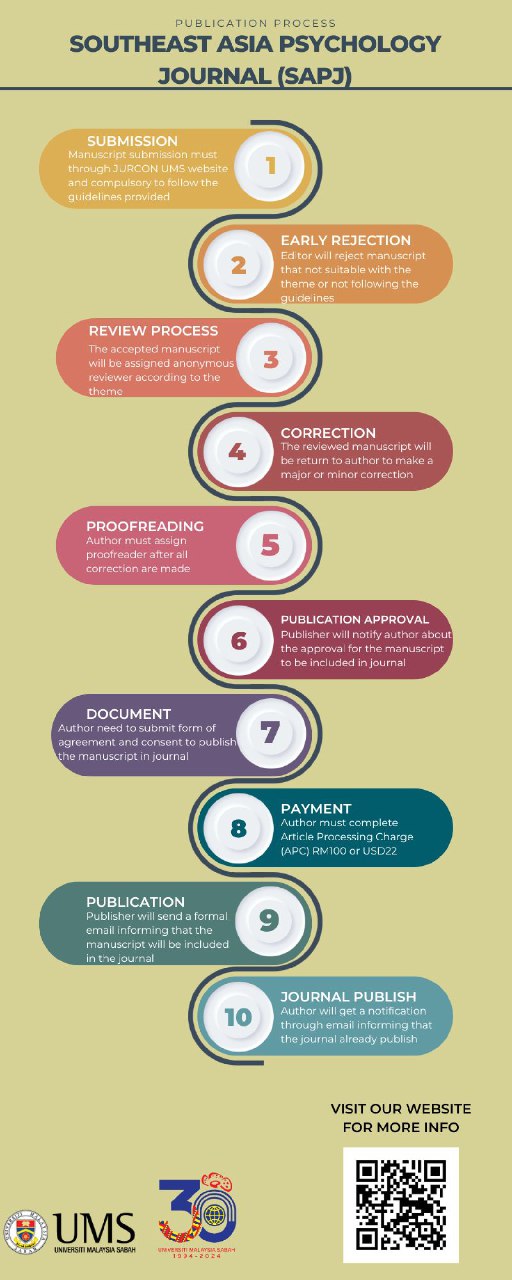THE CHALLENGES AND COPING MECHANISM OF ADOLESCENTS WITH SIBLINGS WITH DEVELOPMENTAL DISABILITIES
DOI:
https://doi.org/10.51200/sapj.v9i1.5039Keywords:
Sibling of Developmental Disabilities, Coping Strategies, Sibling Relationships, Family FunctioningAbstract
Adolescents who have a sibling with developmental disabilities were more likely to have more challenges and unpleasant emotions compared to adolescents who have a sibling without developmental disabilities. Besides, the sibling relationships with developmental disabilities siblings were most likely to be affected negatively due to the deficits in cognitive, language, and social skills. Due to the challenges and unpleasant emotions among adolescents with disability siblings, this study was aimed to identify the coping strategies and sibling relationships of the adolescents with developmental disabilities siblings in Malaysia. Besides, this study also aimed to evaluate the perceptions of the adolescents who have a sibling with developmental disabilities in the family functioning. This study was conducted using qualitative research with phenomenological design on 10 participants. The participants were recruited through purposive sampling methods and data were obtained by conducting semi-structure interviews. Based on the result, the most common coping strategies used by the adolescents who have a brother or sister with developmental disabilities were emotional-focused coping strategies. Half of the adolescents reported positive sibling relationships with their brother or sister with developmental disabilities, another half of the adolescents were not. Besides, most of the adolescents perceived poorer communication, problem-solving, decision making, and less satisfaction of leisure time in the family. Therefore, parental training or counselling should be provided to the family who have a child with developmental disabilities to help the family, included the adolescents to have better coping strategies and sibling relationships to overcome the difficulties.
References
Arim, R. G., Miller, A. R., Kohen, D. E., Guevremont, A, Lach, L. M., & Brehaut, J. C. (2019). Changes in the health of mothers of children with neurodevelopmental disabilities: An administrative data study. Research in Developmental Disabilities, 86, 76-86. doi: 10.1016/j.ridd.2018.12.007
Beavers, R., & Hampson, R. B. (2000). The Beavers System Model of family functioning. Journal of Family Therapy, 22, 128-143. doi: 10.1111/1467-6427.00143
Beavers, R., & Hampson, R. B. (2003). Measuring family competence: The Beavers Systems Model. In F. Walsh (Ed.), Normal family processes (3rd ed., pp. 549-580). New York, NY: Guilford Press.
Begum, G., & Blacher, J. (2011). The sibling relationships of adolescents with and without intellectual disabilities. Research in Developmental Disabilities, 32, 1580–1588. doi: 10.1016/j.ridd.2011.01.056
Braun, V., & Clarke, V. (2006). Using thematic analysis in psychology. Qualitative Research in Psychology, 3(2), 77-101. doi:10.1191/1478088706qp063oa
Caicedo, C. (2014). Families with special needs children: Family health, functioning, and care burden. Journal of the American Psychiatric Nurses Association, 20(6), 398–407. doi: 10.1177/1078390314561326
Carlson, J. M., & Miller, P. A. (2017). Family burden, child disability, and the adjustment of mothers caring for children with epilepsy: Role of social support and coping. Epilepsy & Behavior, 68, 168-173. doi: 10.1016/j.yebeh.2017.01.013 Chien, A., Kuhlthau, K., Toomey, S., Quinn, J., Okumura, M., Kuo, D., Houtrow, A., Van Cleave, J., Landrum, M., Jang, J., Janmey, I., Furdyna, M. and Schuster, M., (2017). Quality of Primary Care for Children With Disabilities Enrolled in Medicaid. Academic Pediatrics, 17(4), pp.443-449. https://doi.org/10.1016/j.acap.2016.10.015
Chien, A., Toomey, S., Kuo, D., Van Cleave, J., Houtrow, A., Okumura, M., Westfall, M., Petty, C., Quinn, J., Kuhlthau, K. and Schuster, M., (2019). Care Quality and Spending Among Commercially Insured Children With Disabilities. Academic Pediatrics, 19(3), pp.291-299. https://doi.org/10.1016/j.acap.2018.06.004
Choi, H., & van Riper, M. (2014). Maternal perceptions of sibling adaption in Korean families of children with Down Syndrome. Journal of Intellectual Disability Research, 58, 962-977. https://doi.org/10.1111/jir.12126
Creswell, J. W., & Creswell, J. D. (2018). Research design: Qualitative, quantitative, and mixed methods approaches, (5th ed.). Thousand Oaks: SAGE Publications Inc.
Crowe, A., & Lyness, K. P. (2014). Family functioning, coping, and distress in families with serious mental illness. The Family Journal: Counseling and Therapy for Couples and Families, 22(2), 186-197. https://doi.org/10.1177/1066480713513552 Davis, R., & Kiang, L., (2020). Parental stress and religious coping by mothers of children with autism. Psychology of Religion and Spirituality, 12(2), pp.137-148. https://doi.org/10.1037/rel0000183
Department of Statistics Malaysia. (2019). Demographic statistics third quarter 2019, Malaysia. Retrieved from https://www.dosm.gov.my/v1/index.php?r=column/cthemeByCat&cat=430&bul_id=YkdwYkZYOVQ5WFJ4dXhEelNpbGRmZz09&menu_id=L0pheU43NWJwRWVSZklWdzQ4TlhUUT09
Dirks, M. A., Persram, R., Recchia, H. E., & Howe, N. (2015). Sibling relationships as sources of risk and resilience in the development and maintenance of internalizing and externalizing problems during childhood and adolescence. Clinical Psychology Review, 42, 145-155. https://doi.org/10.1016/j.cpr.2015.07.003
Faw, M. H. (2018). Supporting the supporter: Social support and psychological stress among caregivers of children with severe disabilities. Journal of Social and Personal Relationship, 35(2), 202-223. https://doi.org/10.1177/0265407516680500
Felizardo, S., Ribeiro, E., & Amante, M. J. (2016). Parental adjustment to disability, stress indicators and the influence of social support.Procedia – Social and Behavioral Sciences, 217, 830-837. https://doi.org/10.1016/j.sbspro.2016.02.157
Fiske, K. E., Pepa, L., & Harris, S. L. (2014). Supporting parents, siblings, and grandparents of individuals with autism spectrum disorders. In Volkmar, F. R., Paul, R., Rogers, S. J., & Pelphrey, K. A. (Eds.), Handbook of Autism and Pervasive Developmental Disorder (4th ed., pp. 933 – 945).
Fullerton, J. M., Totsika, V., Hain, R., & Hastings, R. P. (2016). Siblings of children with life-timing conditions: Psychological adjustment and sibling relationship. Child: Care, Health and Development, 43(3), 393-400. https://doi.org/10.1111/cch.12421
Furman, W., & Buhrmester, D. (1985). Children’s Perceptions of the Qualities of Sibling Relationships. Child Development, 56(2), 448 – 461. https://doi.org/10.2307/1129733
Gorjy, R. S., Fielding, A., & Falkmer, M. (2017). “It’s better than it used to be”: Perspectives of adolescent siblings of children with an autism spectrum condition. Child & Family Social Work, 22(4), 1488-1496. https://doi.org/10.1111/cfs.12371
Haukeland, Y. B., Fjermestad, K. W., Mossige, S., & Vatne, T. M. (2015). Emotional experiences among siblings of children with rare disorders. Journal of Pediatric Psychology, 40(7), 712 – 720. https://doi.org/ 10.1093/jpepsy/jsv022
Hsiao, Y. J. (2018). Parental stress in families of children with disabilities. Intervention in School and Clinic, 53(4), 201-205. https://doi.org/10.1177/1053451217712956
Hughes C., McHarg, G., & White, N. (2018). Sibling influences on prosocial behaviour. Current Opinion in Psychology, 20, 96-101. https://doi.org/10.1016/j.copsyc.2017.08.015
Karakas, G., & Yaman, C. (2014). The role of family in motivating the children with disabilities to do sport. Procedia – Social and Behavioral Sciences, 152, 426-429. https://doi.org/10.1016/j.sbspro.2014.09.22
Khoo, Y. S., & Zhooriyati, S. M. (2020). An Exploration on Adolescents’ Meaning in Life, Life Satisfaction and Happiness: A Qualitative Study.MNNF Publisher.
Laghi, F., Lonigro, A., Pallini, S., Bechini, A., Gradilone, A., Marziano, G., & Baiocco, R. (2018). Sibling relationships and family functioning in siblings of early adolescents, adolescents and young adults with autism spectrum disorder. Journal of Child & Family Studies, 27, 793-801. https://doi.org/10.1007/s10826-017-0921-3
Leane, M. (2019). Siblings caring for siblings with intellectual disabilities: Naming and negotiating emotional tensions. Social Science & Medicine, 230, 264–270. https://doi.org/10.1016/j.socscimed.2019.04.022
Lovell, B., & Wetherell, M. A. (2016). The psychophysiological impact of childhood autism spectrum disorder on siblings. Research in Developmental Disabilities, 49, 226-234. https://doi.org/10.1016/j.ridd.2015.11.023
Luijkx, J., van der Putten, A., & Vlaskamp, C. (2017). A value burden? The impact of children with profound intellectual and multiple disabilities on family life. Journal of Intellectual & Developmental Disability, 44(2), 184-189. https://doi.org/10.3109/13668250.2017.1326588
McHale, S. M., Updegraff, K. A., & Feinberg, M. E. (2016). Siblings of youth with Autism Spectrum Disorders: Theoretical perspectives on sibling relationships and individual adjustment. Journal of Autism and Developmental Disorders, 46(2), 589-602. https://doi.org/10.1007/s10803-015-2611-6
Moen, O. L., Hedelin, B., & Hall-Lord, M. L. (2016). Family functioning, psychological distress, and well-being in parents with a child having ADHD. SAGE Open, 1-16. https://doi.org/10.1177/2158244015626767
Olson, D. H. (2011). Faces IV and the Circumplex model: validation study. Journal of Marital and Family Therapy, 37(1), 64–80. https://doi.org/10.1111/j.1752-0606.2009.00175.x
Roper, S. O., Allred, D. W., Mandleco, B., Freeborn, D., & Dyches, T. (2014). Caregiver burden and sibling relationships in families raising children with disabilities and typically developing children. Families, Systems, & Health, 32(2), 241-246. https://doi.org/10.1037/fsh0000047
Rossetti, Z, & Hall, S. (2015). Adult sibling relationships with brothers and sisters with severe disabilities. Research and Practice for Person with Severe Disabilities, 40(2), 120-137. https://doi.org/10.1177/1540796915592829
Takataya, K., Mizuno, E., Kanzaki, Y., Sakai, I., & Yamazaki, Y. (2019). Feelings of siblings having a brother/sister with Down Syndrome.Archives of Psychiatric Nursing, 33, 337-346. https://doi.org/10.1016/j.apnu.2019.01.001
Taylor, J. L., Burke, M. M., Smith, L. E., & Hartley, S. L. (2016). Families of adolescents and adults with intellectual and developmental disabilities. International Review of Research in Developmental Disabilities, 50, 3-37. https://doi.org/10.1016/bs.irrdd.2016.04.001.
Teles, F. M., Resegue, R., & Puccini, R. F. (2016). Care needs of children with disabilities – Use of the Pediatric Evaluation of Disability Inventory. Revista Paulista de Pediatria (English Edition), 34(4), 447-443. https://doi.org/10.1016/j.rppede.2016.02.015
Tomeny, T. S., Ellis, B. M., Rankin, J. A., & Barry, T. D. (2017). Sibling relationships quality and psychosocial outcomes among adult siblings of individuals with autism spectrum disorder and individuals with intellectual disability without autism. Research in Developmental Disabilities, 62, 104-114. https://doi.org/10.1016/j.ridd.2017.01.008
Tsai, H. W. J., Cebula, K., Liang, S. H., & Fletcher-Watson, S. (2018). Siblings’ experiences of growing up with children with autism in Taiwan and the United Kingdom. Research in Developmental Disabilities, 83, 206-216. https://doi.org/10.1016/j.ridd.2018.09.001
Vatne, T. M., & Zahl, E. (2017). Emotional communication in support groups for siblings of children with disabilities. Patient Education and Counseling, 100(11), 2106-2108. https://doi.org/10.1016/j.pec.2017.05.021
Vitaliano, P. P., Russo, J., Carr, J. E., Maiuro, R. D., & Becker, J. (1985). The ways of coping checklist: revision and psychometric properties. Multivariate Behavioral Research, 20, 3-26. https://doi.org/10.1207/s15327906mbr2001_1
Walton, K. M. (2018). Leisure time and family functioning in families living with autism spectrum disorder. Autism, 23(6), 1–14. https://doi.org/10.1177/13623613188124
Young, D., & Limbers, C. A. (2017). Avoidant coping moderates the relationship between stress and depressive emotional eating in adolescents. Eating and Weight Disorders – Studies on Anorexia, Bulimia and Obesity, 22(4), 683-691. https://doi.org/10.1007/s40519-017-0396-7







